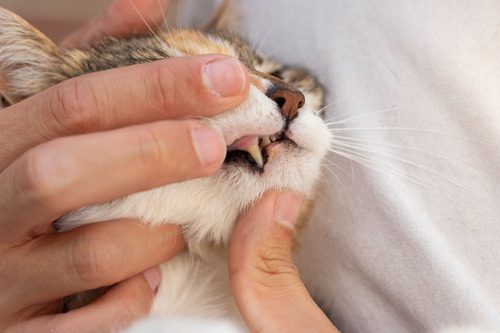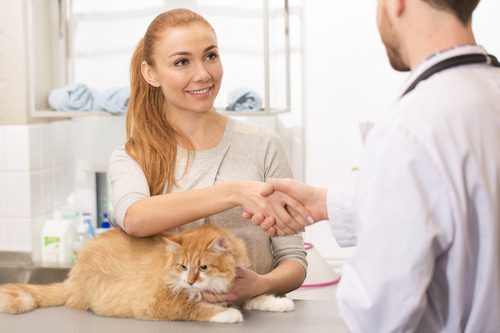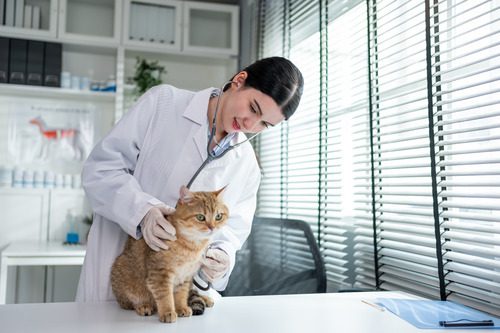Spring Pet Hazards to Avoid in Clifton Park, NY
Are you excited to bid farewell to cold temperatures, short days, and layered clothing of Winter and hop right into Spring? As we move into the new season, many people are thinking about gatherings with family and friends, doing some much-needed cleaning, making improvements, or spending time outdoors.
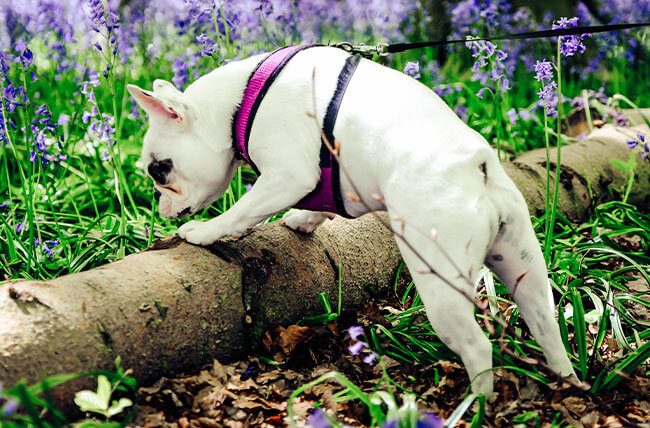
Before you start making plans, it is important to keep your pet’s health and safety at top of mind. Just because Spring is a season of new life does not mean that there are not potential dangers for your dog or cat, inside and outside your home.
Below, we’ll go over some of the most common Spring pet hazards to avoid this season in Clifton Park, NY.
Outdoor Dangers for Pets
Both pets and humans alike enjoy the warmth of Spring. It is the perfect time to get out of the house and enjoy the warmer weather on a walk, at the park, or maybe even a car ride. However, it is also a time that many veterinarians see an increase in allergic reactions, heat-related illnesses, vehicle incidents and even fights between pets.
So, what are some of the most common outdoor hazards you can avoid during Spring?
Garden Flowers
While they may be beautiful to look at, there are several types of flowers that could cause harm to your pet’s health. Flowers like tulips and hyacinths, as well as daffodils, lilies and azaleas all contain toxins.
In most cases, they can cause vomiting, diarrhea, or sluggishness, which can lead to other serious issues like dehydration. If you are concerned that your dog or cat has eaten a toxic flower or bulb, reach out to your veterinarian for guidance.
Fertilizers/Pesticides
While fertilizers are great for our plants, they are not always good for our pets. Most fertilizers are not toxic enough to cause serious harm to your dog or cat, but there are some that can be deadly if not addressed by a veterinary professional. Check for certain ingredients that could cause harm, including blood/bone meal, disulfoton, organophosphate, and iron. The issues these ingredients can lead to range from gastrointestinal irritation and inflammation to damage of the heart and liver.
One specific pesticide to watch out for is metaldehyde, which can sometimes be found in slug and snail pellets. Even small amounts of this product can lead to your dog or cat’s coordination being diminished, seizures, and, in serious cases, death.
Insect Bites/Stings
If you have a curious cat or dog, you may often see them chasing a variety of insects during the Spring and Summer months. It is just harmless play, but it can become very serious if your dog or cat is stung by one of these pests.
Like humans, a bee sting does not always cause problems. In most cases, it can be relieved by finding and removing the stinger, and thoroughly washing the area. However, some animals can have an allergic reaction to stings, which may mean needing to seek the help of your veterinarian. If your dog or cat has been stung look for signs of pain, swelling or breathing problems.
In addition to insects like bees and wasps, you also need to protect your pet from pests like ticks. Ticks can carry and spread a variety of diseases, including Lyme’s Disease and Rocky Mountain Spotted Fever. Talk to your veterinarian about ways to prevent these types of bites.
Medications
Seasonal allergies can be a problem for both humans and pets. This time of year, many people are starting to feel symptoms such as runny or congested nose, itchy throat, burning eyes. The solution for relief, in many cases, is an antihistamine.
While there are some antihistamines that are safe for dogs, do not take the chance without consulting with your veterinarian. If not given the proper medication, antihistamines can cause loss of coordination, vomiting and lethargy. Larger amounts of antihistamines can even cause a coma.
Indoor Dangers for Pets in the Spring
While Spring is one of the best times of year to get outside, there are a lot of things happening inside homes, too. In addition to Spring cleaning and making home improvements, many people are getting together with their family and friends to celebrate special occasions, and just spend time together. So, what is the harm in that? More than you think when it comes to your pet.
Holiday Treats/Decorations
Right after Spring is ushered in, many people will be celebrating Easter. But some of those treats and gift baskets can pose a serious threat to your pet. Most people know that chocolate is toxic for dogs and cats. The plastic grass often used for decorating, if ingested, can cause blockages in the digestive system.
You will also want to avoid giving your pets grapes or raisins, as they can lead to kidney failure.
Spring Cleaning
This is a tradition is many households. After staying inside for most of the winter, it is time to clear out the clutter and give your home a little sparkle. But the chemicals used to give your home the deep clean it needs could be dangerous for your pet.
Generally, it is best to keep all cleaning chemicals away from your pets – just like you would with a child. Even some of the more natural products can contain ingredients that are harmful to your pet.
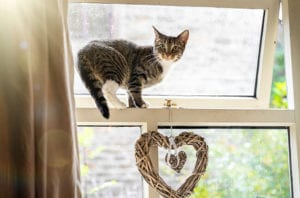
Home Improvements
Spring is also primetime for doing some work around the house. Paints, turpentines, and adhesives can all be toxic for your pets. There are also physical dangers that can be present, when your home is being renovated. Things like nails and screws, sharp blades, and power tools can all cause serious injuries to your dog or cat.
Screen Doors and Windows
There is nothing quite like a Spring breeze. And it is a great time of year to open the windows and doors and enjoy some fresh air. However, if you are not careful, they can pose a risk of falling, or escape. If the screens are not in solidly in place, your dog or cat could easily jump or fall through, leading to a fall injury or them getting lost from home.
Recent Posts
My Cat Lost a Fang Tooth: What Do I Do?
My Cat Lost a Fang Tooth: What Do I Do? It’s always a little jarring to discover…
FHO Surgery in Cats
FHO Surgery in Cats When a cat experiences hip pain that limits movement and quality of life,…
Can Cats Get Parvo?
Can Cats Get Parvo? Parvo is a word that strikes fear into the hearts of many dog…
About Us
Originally opened as Animal Care Hospital by Dr. Mark Johnston in 1989, the hospital became Cornerstone Veterinary Hospital in 2015 when it was purchased by Drs. Alan and Lisa Knott. The name 'Cornerstone' holds a special place in their hearts, representing not only their Christian faith but also their commitment to being the cornerstone of the community in which they practice. As a family-owned and operated practice, every pet is treated as part of the family, ensuring they receive the highest standard of care. The team at Cornerstone Veterinary Hospital is dedicated to building lasting relationships with clients and their beloved pets, striving to be the cornerstone of the community in which they practice.
